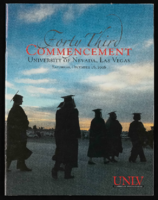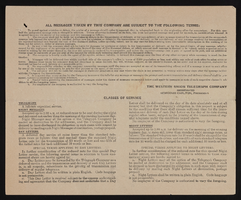Search the Special Collections and Archives Portal
Search Results
Young Electric Sign Company (YESCO) Corporate Records
Identifier
Abstract
The Young Electric Sign Company (YESCO) Corporate Records (1914-2000) document the history of the Young Electric Sign Company (YESCO) and is comprised of photographs of sign production and finished signs, negatives, slides, transparencies, anniversary scrapbooks, and videotapes. The collection also contains meeting minutes, correspondence, price books, drawings, calculations, newspaper and trade magazine articles on YESCO, advertising materials, and oral history interviews and audio recordings of YESCO designers and executives. YESCO is responsible for many of the neon signs in and around Las Vegas, Nevada and Reno, Nevada, as well as other Western states.
Archival Collection

Transcript of interview with Sandra Peña by Lada Mead and Stefani Evans, March 27, 2017
Date
Archival Collection
Description
Sandra Peña’s story begins in East Los Angeles, where she spent her first fifteen years with her parents (both from Michoacán, Mexico), and her younger sister. The father's managerial position at Master Products allowed the family to live rent-free in a company-owned house behind the main factory, because he collected the rents for the company's two other dwellings. In this interview, Peña recalls the family move to Porterville, in California's Central Valley, her return to Los Angeles at nineteen, and her work with Parson’s Dillingham, a contractor for the Metrolink rail system. She draws the link between the Los Angeles and Las Vegas construction communities by describing her husband's move to Las Vegas to find work; a chance Las Vegas encounter with a friend from Chino, California; her ability to gain employment in Las Vegas at Parson’s, a company that had joint ventured with Parson’s Dillingham, and her move from there to Richardson Construction, a local minority-owned company. As Peña says, "It's kind of all intermingled. Even if you go here and you go there, it's like everybody knows everybody." Throughout, Peña weaves her family story into the narrative as she describes her youth, the birth of her son, the illness and death of her father, and her family's participation in her current employment with Richardson. As she remembers the people, places, and events of her life, Peña speaks to the ways one woman of color built on her interstate construction connections and rose in a male-dominated industry.
Text
MGM Mirage Records on Mandalay Resort Group
Identifier
Abstract
The MGM Mirage Records on Mandalay Resort Group consists of materials from Mandalay Resort Group’s office of public relations and community affairs records, which was closed after Mandalay’s corporate merger with MGM Mirage in 2005. The files, dating from 1968 to 2005, provide documentation of Mandalay Resort Group’s external affairs and internal operations. They contain subject files, photographs, negatives, slides, correspondence, VHS tapes, corporate publications, press releases, press kits, wholesale room agreements, hotel ephemera, employee newsletters, and press clippings. Of particular interest are files and photographs documenting the planning, development, construction, and opening of the Mandalay Resort Group properties.
Archival Collection

University of Nevada, Las Vegas (UNLV) 43rd commencement program
Date
Archival Collection
Description
Commencement program from University of Nevada, Las Vegas Commencement Programs and Graduation Lists (UA-00115).
Text

Transcript of interview with Darlene Kelly by David P. Wiser, March 16, 1975
Date
Archival Collection
Description
On March 16, 1975, David P. Wiser interviewed former hair dresser and dealer, Darlene Kelly (born December 1st, 1942 in San Francisco, California) in the collector’s home in Las Vegas, Nevada. The two discuss how Kelly first arrived in Las Vegas, as well as her occupational history. Kelly goes on to describe the Stewart Ranch, as well as the social environment of the forties and fifties in Southern Nevada.
Text
Audio from interview with Mike and Sallie Gordon, March 2, 1977
Date
Archival Collection
Description
Full interview audio with Mike and Sallie Gordon in March 1977 in which they discuss arriving in Las Vegas and their business enterprises.
Sound

Dr. Nancy Leveque interview, July 3, 1975: transcript
Date
Archival Collection
Description
On July 3, 1975, Robin Wright interviewed Doctor Nancy Leveque (b. 1933 in Oak Park, Illinois) about her time living in Las Vegas, Nevada. The interview covers, among many wide-ranging topics, Leveque’s move to and away from Las Vegas, her career as a veterinarian, and the practice she and her then-husband built. Leveque also discusses how the city of Las Vegas has changed-environmentally and socially-, special interest groups and social activities, as well as natural phenomena. Throughout the course of the interview, Leveque provides anecdotes about prominent figures and old Las Vegas traditions, such as Helldorado.
Text

Transcript of interview with Ellen DeLand by Dennis McBride, January 19-20, 1996
Date
Archival Collection
Description
Ellen DeLand was born on April 1, 1931 and went to Santa Monica High School. She was very active in the Las Vegas LGBT community. She was interviewed January 19, 1996.
Text

Eric Mendoza oral history interview: transcript
Date
Archival Collection
Description
Oral history interview with Eric Mendoza conducted by Holly O'Donnell on November 29, 2021 for Reflections: The Las Vegas Asian American and Pacific Islander Oral History Project. In this interview, Eric Mendoza shares his family's chain migration history from Manila, Philippines to the United States and his difficult immigration and naturalization process once arriving in America in 1996. He talks about what brought him to live in Las Vegas, Nevada, his education and professional pursuits, what his life is like in the United States compared to that of the Philippines, and the lives of his eight siblings. Eric Mendoza discusses the historical past of the Philippines, the infrastructure in place there, and government corruption. He also speaks to Filipino traditions and festivals, food and customs, his cultural identity, and assimilating to American culture.
Text

